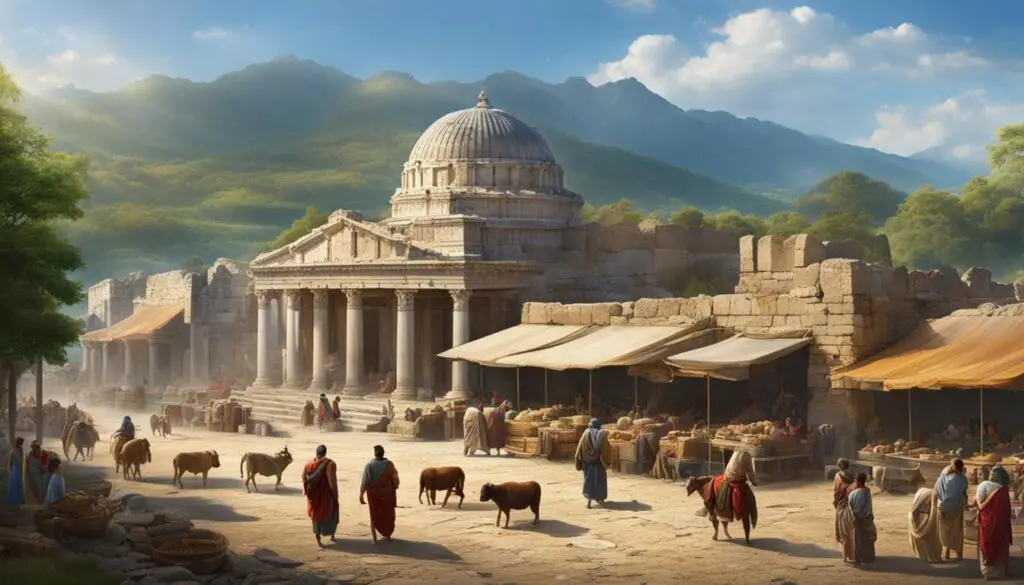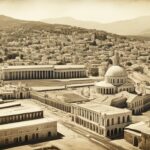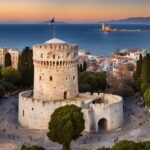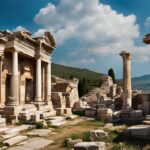Philippi is a place of immense biblical importance, closely associated with notable biblical figures and significant biblical events. This hidden treasure in history played a crucial role in ancient times and continues to captivate visitors with its rich heritage.
Key Takeaways:
- Philippi holds great biblical importance and is mentioned multiple times in the New Testament.
- Notable biblical figures like the apostle Paul, Silas, Timothy, and Lydia are linked to Philippi.
- In biblical times, Philippi was a thriving Roman colony with strategic importance and impressive Roman architecture.
- Major biblical events in Philippi include the conversion of Lydia and Paul’s imprisonment.
- The impact of these events shaped the city’s history and cultural heritage.
The Biblical Importance of Philippi
Philippi holds great biblical importance as it is mentioned several times in the New Testament. The apostle Paul visited Philippi during his missionary journeys and established the first Christian church in Europe. He wrote the Epistle to the Philippians while under house arrest in Rome. Philippi is also known for the conversion of Lydia, a prominent figure in early Christianity.
Paul’s visit to Philippi marked a significant turning point in the spread of Christianity. As mentioned in the Acts of the Apostles, Paul and his companions were led by a vision to preach the gospel in Macedonia, which included the city of Philippi. It was here that Paul encountered Lydia, a wealthy businesswoman who became one of the first converts to Christianity in Europe.
“And on the Sabbath day we went outside the gate to the riverside, where we supposed there was a place of prayer, and we sat down and spoke to the women who had come together. One who heard us was a woman named Lydia, from the city of Thyatira, a seller of purple goods, who was a worshipper of God. The Lord opened her heart to pay attention to what was said by Paul. And after she was baptized, and her household as well, she urged us, saying, ‘If you have judged me to be faithful to the Lord, come to my house and stay.’ And she prevailed upon us.” – Acts 16:13-15
Philippi’s biblical importance extends beyond Paul’s visit and Lydia’s conversion. The Epistle to the Philippians, written by Paul, is a significant letter in the New Testament that offers teachings and guidance to the early Christian community in Philippi. This letter reflects the strong bond between Paul and the Philippians, showing the enduring influence of this city on the development of early Christianity.
The Conversion of Lydia
In the book of Acts, the conversion of Lydia highlights the impact Philippi had on the spread of Christianity. Her conversion not only demonstrated the power of the gospel but also marked the beginning of the Christian community in Philippi. Lydia’s influence as a prominent figure in the city likely played a significant role in the growth and establishment of the early church.
| Biblical Event | Significance |
|---|---|
| Establishment of the First Christian Church in Europe | Paul’s visit to Philippi led to the establishment of the first Christian church in Europe, marking a significant milestone in the spread of Christianity. |
| Conversion of Lydia | Lydia’s conversion to Christianity marked the beginning of the Christian community in Philippi, highlighting the influential role of the city in the early church. |
| The Epistle to the Philippians | Paul’s letter to the Philippians provided guidance and encouragement to the early Christian community and showcases the enduring connection between Paul and the people of Philippi. |
Notable Biblical Figures Linked to Philippi
Philippi is closely associated with several notable biblical figures. The apostle Paul, along with his companions Silas and Timothy, had a significant presence in Philippi. Their interactions with the local community and their teachings have left a lasting impact on the city’s history. Lydia, a wealthy businesswoman, is another important figure associated with Philippi and is known for her conversion to Christianity.
The apostle Paul’s connection to Philippi is particularly noteworthy. He played a vital role in the establishment of the first Christian church in Europe. Paul’s visits to the city and his teachings not only influenced the early Christian community in Philippi but also had a broader impact on the spread of Christianity throughout the region.
“And a vision appeared to Paul in the night: a man of Macedonia was standing there, urging him and saying, ‘Come over to Macedonia and help us.’” – Acts 16:9
In addition to Paul, his companions Silas and Timothy were also closely associated with Philippi. Silas accompanied Paul on his missionary journeys and played a significant role in the ministry and teachings of the early Christian community in Philippi. Timothy, another close companion of Paul, assisted in the establishment and growth of the church in Philippi.
| Notable Biblical Figures | Role |
|---|---|
| Paul | Apostle and founding figure of the first Christian church in Europe |
| Silas | Accompanied Paul and assisted in the ministry in Philippi |
| Timothy | Assisted in the establishment and growth of the church in Philippi |
| Lydia | Wealthy businesswoman who converted to Christianity in Philippi |
Lydia, a prominent figure in early Christianity, became a believer during Paul’s visit to Philippi. Her conversion marked a significant milestone in the spread of the Christian faith in the city. As a successful businesswoman, Lydia played an important role in supporting the Christian community and its activities in Philippi.
The influence of these notable biblical figures and their contributions to the growth of Christianity in Philippi cannot be overstated. Their teachings, conversions, and interactions with the local community shaped the spiritual landscape of the city and left an enduring legacy that continues to be celebrated and explored today.
Philippi in Biblical Times
In biblical times, Philippi was a thriving Roman colony situated in a strategically important location. This ancient city was positioned along the Via Egnatia, a major trade route connecting Rome to the East. The strategic location of Philippi made it an essential hub for commerce and cultural exchange, attracting merchants, travelers, and settlers from all over the Roman Empire.
Philippi boasted impressive Roman architecture that showcased the grandeur and sophistication of the time. The city’s Roman ruins included a magnificent theater, where dramatic performances and cultural events took place. Additionally, Philippi had an amphitheater that hosted gladiatorial contests, a testament to the Roman taste for entertainment. The city also had a forum, which served as the administrative and social center of Roman life in Philippi.
As a Roman colony, Philippi was designed and built to reflect the architectural and urban planning principles of the Roman Empire. The city’s layout was carefully structured with wide streets, public squares, and well-designed buildings, embodying the Roman ideals of order and efficiency. These architectural marvels of Philippi provide us with a glimpse into the grandeur and sophistication of the Roman Empire during biblical times.
The Roman Architecture of Philippi
| Building | Description |
|---|---|
| Theater | Ancient venue for performances and cultural events. |
| Amphitheater | Hosted gladiatorial contests and other spectacles. |
| Forum | The administrative and social center of Roman life. |
“The Roman architecture in Philippi stands as a testament to the grandeur and cultural significance of the Roman Empire during biblical times. It showcases the mastery and innovation of Roman engineering and design, providing valuable insights into the lifestyle and aspirations of the people who lived in this remarkable city.” – Dr. Sarah Johnson, Archaeologist
Major Biblical Events in Philippi
Philippi, a city of great biblical significance, has been the stage for several major events mentioned in the New Testament. One such event was the conversion of Lydia, a prominent figure who played a pivotal role in the spread of Christianity in Philippi. Her conversion marked the beginning of a thriving Christian community in the city.
Another significant event was the imprisonment of the apostle Paul in Philippi. While in prison, an earthquake shook the foundation, but Paul and the other prisoners remained unharmed. This miraculous event led to the conversion of the jailer, who was deeply moved by the power of God demonstrated through Paul.
“Sirs, what must I do to be saved?” the jailer asked Paul and Silas, recognizing their divine connection. They responded, “Believe in the Lord Jesus, and you will be saved—you and your household.” The jailer and his family were baptized, marking another turning point in the city’s spiritual journey (Acts 16:30-34).
The conversion of Lydia and the jailer’s conversion after the earthquake were transformative moments that solidified the Christian faith in Philippi. These events not only left an indelible mark on the city’s history but also exemplified the power of God’s grace and the transformative nature of the gospel.

| Event | Description |
|---|---|
| Conversion of Lydia | Lydia, a prominent merchant, was converted to Christianity after hearing Paul’s teachings. Her conversion marked the beginning of the Christian community in Philippi. |
| Paul’s Imprisonment | Paul and Silas were imprisoned in Philippi for their missionary work. During their imprisonment, an earthquake occurred but they remained unharmed. The event led to the conversion of the jailer and his family. |
| Jailer’s Conversion | The jailer, witnessing the earthquake and Paul’s unwavering faith, sought salvation and converted to Christianity, along with his household. |
The Impact of Biblical Events on Philippi’s History
The biblical events that took place in Philippi had a profound impact on the city’s history and development. As the birthplace of Christianity in Europe, Philippi became a significant center for the Christian community and contributed to its cultural heritage.
Notable Figures and their Influence
Several notable biblical figures were linked to Philippi, leaving a lasting impact on the city. The apostle Paul, along with his companions Silas and Timothy, played a crucial role in the establishment and growth of the Christian community in Philippi. Their teachings and interactions with the local population shaped the city’s identity and religious practices.
Another influential figure associated with Philippi is Lydia, a wealthy businesswoman who played a pivotal role in the early spread of Christianity. Her conversion and support for the Christian community contributed to the city’s transformation and the spread of the faith.
Transformation and Cultural Heritage
The major biblical events that occurred in Philippi brought about a profound transformation in the city. The establishment of the Christian community introduced new religious practices, beliefs, and cultural traditions. The teachings of Paul and the growth of Christianity played a crucial role in shaping the city’s cultural heritage, leaving an indelible mark on its history.
Philippi’s rich cultural heritage is reflected in its architecture, art, and traditions. The city’s Roman ruins, such as the theater and the forum, stand as reminders of its ancient past. These remnants of the past serve as a tangible link to the biblical events that unfolded there, attracting visitors from around the world who seek to explore and understand the origins of Christianity.
| Biblical Event | Impact |
|---|---|
| Conversion of Lydia | Marked the beginning of Christianity in Philippi and led to the growth of the Christian community. |
| Paul’s Imprisonment and Jailer’s Conversion | The earthquake that occurred during Paul’s imprisonment and the subsequent conversion of the jailer highlighted the power and influence of the Christian faith, further solidifying its presence in Philippi. |
The impact of these biblical events on Philippi’s history cannot be overstated. They shaped the religious, social, and cultural fabric of the city, making it a place of immense significance for Christians around the world.
Philippi Today
Philippi, with its rich historical heritage and biblical significance, has become a popular destination for tourists. The city is home to numerous historical sites and archaeological excavations that offer a glimpse into its storied past. Visitors can explore the ancient theater, the baptismal site of Lydia, and the prison where the apostle Paul was held. These sites provide an immersive experience, allowing visitors to step back in time and connect with the city’s biblical significance.
One of the main attractions in Philippi is the ancient theater, which showcases the remarkable Roman architecture of the city. Visitors can marvel at the well-preserved seating area and imagine the grand performances that once took place on its stage. Another notable site is the baptismal site of Lydia, where the conversion of this influential biblical figure took place. The location holds great spiritual significance for many visitors.
Philippi’s archaeological excavations are also of great interest to tourists. The ancient ruins provide insights into the city’s past, with fragments of Roman buildings, streets, and walls still visible today. These excavations offer a unique opportunity to witness history firsthand and understand the city’s role in biblical times.
| Attractions and Tourism in Philippi | Description |
|---|---|
| Ancient Theater | A well-preserved theater showcasing remarkable Roman architecture. |
| Baptismal Site of Lydia | The location of Lydia’s conversion, a significant event in early Christianity. |
| Archaeological Excavations | Fragments of Roman buildings, streets, and walls providing insights into the city’s past. |
Philippi’s historical sites and archaeological excavations make it an ideal destination for history enthusiasts and tourists seeking to immerse themselves in the biblical significance of the city. Exploring these sites offers a deeper understanding of the city’s past and its role in shaping Christianity.
Attractions and Tourism in Philippi
Philippi offers a wide range of attractions and activities for tourists, making it a captivating destination for history enthusiasts and travelers alike. From exploring well-preserved Roman ruins to experiencing the natural beauty of the surrounding area, Philippi has something for everyone.
One of the main attractions in Philippi is the Caesarea National Park. This archaeological site provides visitors with a glimpse into the grandeur of ancient Roman architecture. Here, you can wander through the ruins of the Caesarea Roman Port and marvel at the remains of the Caesarea Amphitheatre. The park offers a unique blend of history and stunning coastal scenery, making it a must-visit for history buffs and nature lovers.
Another highlight of Philippi is the Caesarea Roman Ruins. These well-preserved ruins showcase the impressive architecture and engineering of the ancient Roman Empire. Visitors can explore the ancient city’s streets, buildings, and even the remains of an ancient aqueduct. It’s a fascinating journey through time and a chance to learn more about the city’s rich historical heritage.
| Attractions | Description |
|---|---|
| Caesarea National Park | An archaeological site that provides a glimpse into ancient Roman architecture. It features ruins such as the Caesarea Roman Port and the Caesarea Amphitheatre. |
| Caesarea Roman Ruins | Well-preserved ruins that showcase the impressive architecture and engineering of the ancient Roman Empire. Visitors can explore the ancient city’s streets, buildings, and remnants of an aqueduct. |
Aside from these historical sites, Philippi also offers other activities for visitors to enjoy. The city’s vibrant market, filled with local vendors and artisans, is a great place to immerse yourself in the local culture. You can discover unique souvenirs, taste traditional cuisine, and interact with the friendly locals.
For those seeking outdoor adventures, the surrounding region of Philippi is a paradise for hikers and nature enthusiasts. The area is blessed with breathtaking landscapes, including lush forests, tranquil lakes, and scenic hiking trails. The natural beauty of Philippi’s surroundings offers endless opportunities for exploration and relaxation.
With its fascinating historical sites, cultural experiences, and natural wonders, Philippi has become a must-visit destination for tourists seeking a unique blend of history, culture, and outdoor adventures. Whether you’re a history enthusiast, nature lover, or simply looking for a memorable vacation, Philippi will not disappoint.
Conclusion
Philippi, a city of remarkable historical significance, holds a hidden treasure of biblical importance. Its connections to notable biblical figures and the occurrence of major biblical events make it a captivating destination for those seeking to explore the roots of Christianity. With its well-preserved archaeological sites and captivating tales, Philippi continues to fascinate visitors, offering a unique glimpse into its storied past.
Throughout history, Philippi has been associated with prominent biblical figures such as the apostle Paul, Silas, Timothy, and Lydia. Their presence and teachings have left an enduring impact on the city’s cultural and religious heritage, shaping its identity and fostering a thriving Christian community.
In biblical times, Philippi served as a thriving Roman colony, strategically located on the Via Egnatia trade route. The city boasted impressive Roman architecture, including a theater, an amphitheater, and a forum. Its prosperity and bustling activity contributed to its significance in the region.
Major biblical events unfolded in Philippi, leaving an indelible mark on its history. The conversion of Lydia, a prominent figure in early Christianity, marked the beginning of the faith in Philippi. Moreover, the imprisonment of the apostle Paul and the subsequent conversion of the jailer after an earthquake shook the prison further shaped the city’s narrative.
Today, Philippi stands as a testament to its rich history and biblical significance. Tourists can explore the city’s archaeological sites, including the ancient theater, the baptismal site of Lydia, and the prison where Paul was held. Philippi’s captivating tales and well-preserved remnants continue to allure visitors, making it a must-visit destination for history enthusiasts and those seeking to uncover a hidden treasure of biblical heritage.
FAQ
What is the biblical importance of Philippi?
Philippi holds great biblical importance as it is mentioned several times in the New Testament. The apostle Paul visited Philippi during his missionary journeys and established the first Christian church in Europe. He wrote the Epistle to the Philippians while under house arrest in Rome.
Which notable biblical figures are linked to Philippi?
Philippi is closely associated with several notable biblical figures. The apostle Paul, along with his companions Silas and Timothy, had a significant presence in Philippi. Their interactions with the local community and their teachings have left a lasting impact on the city’s history. Lydia, a wealthy businesswoman, is another important figure associated with Philippi and is known for her conversion to Christianity.
What was Philippi like in biblical times?
In biblical times, Philippi was a thriving Roman colony. It held strategic importance due to its location on the Via Egnatia, a major trade route connecting Rome to the East. The city boasted impressive Roman architecture, including a theater, an amphitheater, and a forum. It was a prosperous and bustling city that played a significant role in the region.
What were the major biblical events in Philippi?
Philippi witnessed several major biblical events. One of the notable events was the conversion of Lydia, which marked the beginning of Christianity in Philippi. Another significant event was Paul’s imprisonment in Philippi, which led to the conversion of the jailer after an earthquake shook the prison.
How did the biblical events impact Philippi’s history?
The major biblical events that occurred in Philippi had a profound impact on its history. The establishment of the Christian community brought about a cultural and religious transformation in the city. The teachings of Paul and the growth of Christianity played a crucial role in shaping Philippi’s identity and cultural heritage.
What can tourists explore in Philippi today?
Today, Philippi is a popular destination for tourists interested in its rich historical heritage. The city is home to various archaeological sites, including the ancient theater, the baptismal site of Lydia, and the prison where Paul was held. These sites offer visitors a glimpse into the city’s past and its biblical significance.
What attractions and tourism options are available in Philippi?
Philippi offers a range of attractions for tourists. The city is known for its well-preserved Roman ruins, including the theater and the forum. The Caesarea National Park and Caesarea Port are popular destinations for visitors, providing a deeper insight into the Roman history of the region. Philippi’s rich cultural and historical heritage make it a must-visit place for history enthusiasts and tourists alike.
Why is Philippi considered a hidden treasure in history?
Philippi stands as a hidden treasure in history, with its rich biblical significance and historical heritage. The city’s connections to notable biblical figures and the occurrence of major biblical events make it an intriguing destination for those interested in exploring the roots of Christianity. Philippi’s captivating tales and well-preserved archaeological sites continue to fascinate visitors, providing a unique glimpse into its storied past.







